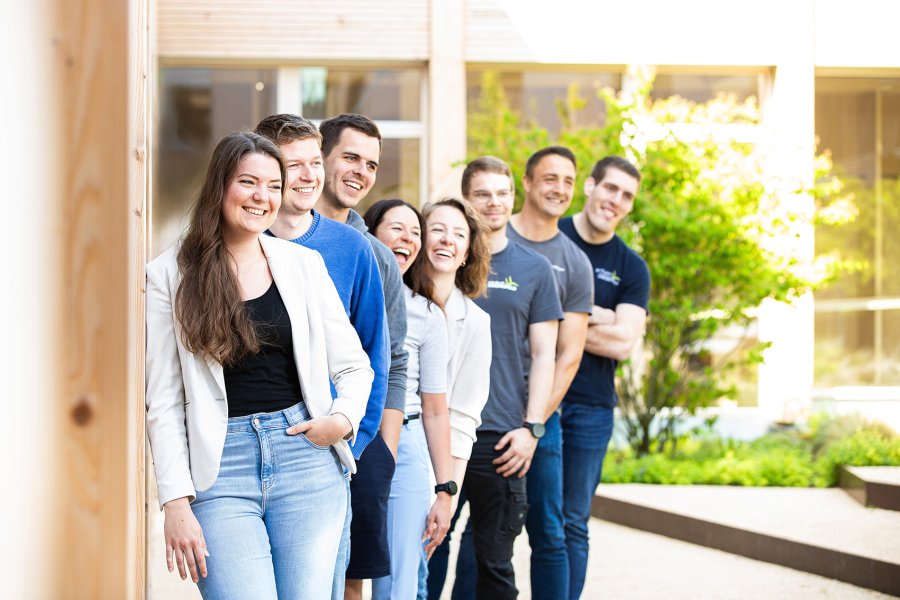Gen Z Survey 2025: Calls for faster sustainable transformation
The shortage of skilled workers, the weakening economy and geopolitical uncertainties are putting pressure on companies in Austria and Europe. At the same time, there are growing expectations that the economy will become more environmentally and socially sustainable. Against this backdrop, CEOs FOR FUTURE surveyed 922 young people (aged 15-30) and 53 top managers in its comprehensive Gen Z Survey 2025, focusing on sustainability & the economy, skills & know-how, and values & culture.

(from left to right): Markus Winter – CTO Windkraft Simonsfeld I Birgit Kraft-Kinz – CEO of CEOs FOR FUTURE GmbH I Stefan Güldenberg – Professor at EHL Hospitality Business School Lausanne. Photo credit: © CEOs FOR FUTURE / Martin Hron
"Our survey, in which nearly 1,000 people took part, clearly shows that Both generations – Gen Z and top managers – want to see more momentum for the necessary transformation towards sustainability," says Birgit Kraft-Kinz, CEO of CEOs FOR FUTURE GmbH.
Key findings of the 2025 survey
"The results of the CEOs FOR FUTURE Gen Z survey 2025 make it clear: sustainable transformation needs momentum, but also mutual understanding. While young people contribute new ideas, executives expect more economic know-how. Intergenerational dialogue is the bridge that connects the two," explains Stefan Güldenberg, Professor of Strategy and Sustainability at EHL Hospitality Business School Lausanne, Switzerland, who curated the study.
Sustainability & Economy
The results of the Gen Z Survey 2025 clearly show that both Generation Z (53%) and top managers (66%) are convinced that sustainable business practices are the foundation for long-term economic success. That is why both Gen Z and top managers are calling for the necessary transformation to be accelerated: when it comes to environmental sustainability, 75% of Gen Z and 87% of top managers believe that implementation is too slow; when it comes to social sustainability, the figures are 70% of Gen Z and 78% of executives.
Skills & know-how
Both Gen Z and top managers see communication skills (62% vs. 72%) and systemic thinking (60% vs. 77%) as key competencies for the success of the transformation.
When asked about the most important prerequisites for further developing their skills in the context of transformation, Gen Z respondents cited financial support for further training (60.7%), access to projects and relevant tasks (58%), networking opportunities and suitable platforms (55%), and improved educational opportunities (53.5%). Top managers see key conditions for young people to be able to contribute their skills more effectively to the transformation in the future, primarily in exchanges with mentors (77.2%), access to projects and tasks (71.7%), and improved educational opportunities (56.6%).
Values & culture
When it comes to values, Gen Z ranks work-life balance (53%) first, followed by sustainability and purpose (31% each). Managers also rate sustainability and purpose (85% each) as key guiding principles. At the same time, they place particular emphasis on honesty and transparency (34%) as well as performance and efficiency (32%). From Gen Z's perspective, top managers primarily embody performance orientation (56%) and career focus (36%). These differences in values and perceptions highlight the importance of open, cross-generational communication – for greater understanding, shared goals and a sustainable corporate culture.
Responsibility & behaviour
Many executives see Gen Z as having greater responsibility: around 36% attribute an active role to them, and 15% even attribute primary responsibility for sustainable transformation to them. Young people themselves also see themselves as part of the solution (49%), but place themselves in the middle of the pack, with 21% confident that they can play an active role and 12% clearly seeing themselves as co-creators, but overall they do not yet feel sufficiently prepared. Gen Z is consistent in its own behaviour: a significant proportion already pays specific attention to sustainability when consuming.
Windkraft Simonsfeld strengthens Gen Z and the energy transition
The example of CEOs FOR FUTURE member Windkraft Simonsfeld clearly illustrates the central role that Generation Z plays in companies. "We live the intergenerational dialogue every day: 25 per cent of our employees are from Gen Z. This generation is a decisive factor for the success of the transformation," emphasises Markus Winter, CTO of Windkraft Simonsfeld, citing specific examples of the successful integration of Gen Z, such as training and further education on climate protection and the energy transition, sustainable benefits such as e-pool vehicle use, flexible working hours and a vegetarian canteen.

‘Austria's economic strength and resilience depend not only on technology, but above all on good cooperation between generations and the exchange of knowledge. Strengthening the skilled workforce is essential in this regard,’ concludes Karl Kienzl, Chairman of CEOs FOR FUTURE, emphasising the importance of dialogue between generations on an equal footing, which CEOs FOR FUTURE actively promotes.
About CEOs FOR FUTURE
CEOs FOR FUTURE is a non-profit association dedicated to promoting and accelerating the sustainable transformation to a fossil-free, environmentally friendly and resource-efficient economy and society. It has more than 100 members – top managers and companies – from various industries as supporters. Wolfgang Anzengruber is the ambassador for the C4F economic platform. The C4F generational platform, with ambassador Doris Schmidauer, focuses on dialogue and exchange with young people and Generation Z – apprentices, young employees, youth organisations – on an equal footing. www.ceosforfuture.at